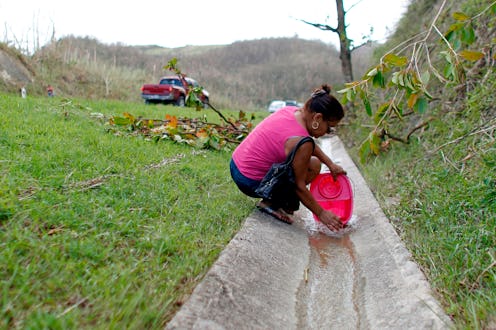
In a press conference Tuesday afternoon, President Donald Trump said the United States is "doing a really good job" helping Puerto Rico recover from Hurricane Maria. But as critics are quick to point out, Trump has been seemingly preoccupied with the "take a knee" protest happening in professional sports, not the more than 3.4 million American citizens affected by the historic storm. On Tuesday, Trump denied that he was otherwise preoccupied, which raises the question of what is actually being done to help Puerto Rico.
In an announcement on Tuesday, the federal government declared it will cover 100 percent of costs associated with debris removal, as well as other emergency protective measures. This aid will last for six months, beginning retroactively on Sept. 17.
According to a press release issued on Monday, Sept. 25 by the Federal Emergency Management Agency, better known as FEMA, "most, if not all, of Puerto Rico continues to be without electricity and usable water." And as of Monday, 516 people and two pets have been rescued during a search of more than 2,500 structures.
According to the agency, a swath of federal agencies have deployed thousands of people to help. Among them are more than 2,500 National Guard members, between Puerto Rico and the U.S. Virgin Islands, who are bringing food and water to those who need it, "augmenting local law enforcement to ensure community safety," and assisting in the rebuilding of infrastructure.
In the press conference, Trump underscored the importance of security assistance, noting that "many of the police in Puerto Rico have lost their homes."
"Sure, they want to be police," Trump said. "But they also want to be able to watch their families and find their families. And they have to live."
The U.S. Air Force is delivering relief supplies, as well assisting the Federal Aviation Administration with air traffic control repairs, according to FEMA. Additionally, the U.S. Department of Energy is helping the Puerto Rico Electric Power Authority, the government-owned power company, evaluate damage and make repairs. Other federal bodies, such as the U.S. Department of Homeland Security and the U.S. Department of Interior, are also contributing to aid and reconstruction.
Additionally, FEMA reported, "Red Cross disaster responders from Colombia, Costa Rica, Honduras, Mexico, Finland, Denmark, and Spain" are assisting with relief efforts in both Puerto Rico and the U.S. Virgin Islands.
But as aid swoops in from virtually every direction, the speed with which the federal government issued aid is under scrutiny. As Philip Bump wrote in The Washington Post, emergency supplies could have been sent in advance. Additionally, Bump argues, after Maria hit, relief could have arrived to Puerto Rico faster than it has.
Trump used the fact that Puerto Rico is an island to explain the delays. "It’s out in the ocean," he said. "You can’t just drive your trucks there from other states.”
But as Bump explained, ships could have been planted close to Puerto Rico in anticipation of catastrophe. It was known well in advance that Hurricane Maria would likely wreak historic damage — it was slated to be the strongest storm to strike the area in over 80 years, after all. And in August, supplies were sent in advance to Texas, which the President bragged about on Twitter, Bump pointed out.
As Molly Hennessy-Fiske reported in the The Los Angeles Times on Tuesday, lines for essentials like food and water were blocks long, and sometimes miles long. And the people, Hennessy-Fiske wrote, are giving up faith in governments both local and federal.
"If there is a dominant sentiment in the capital, it is resignation," Hennessey-Fiske reported.
The fact of the matter is that, while the federal government certainly is responding to the devastation on Puerto Rico, the waiting period between disaster and relief efforts did not have to be so long. Whatever the reason, millions of Puerto Ricans are without basic necessities, and given the advanced warning, geographical excuses don't entirely cover it.